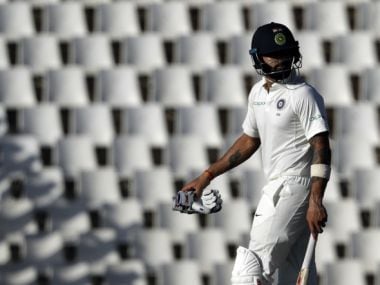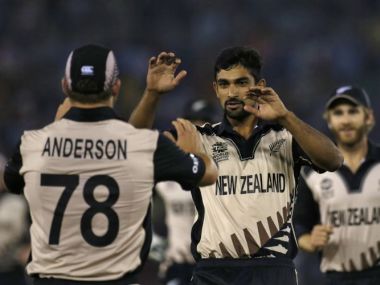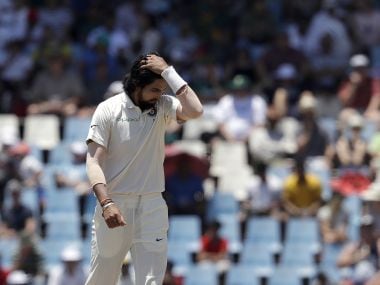India vs South Africa: Fans' disappointment understandable, but they must not lose their sense of balance
It is always upsetting to fail when you had envisioned success as being within your grasp. But as Kipling intimated, we should not laud our team too loudly when they win, or rebuke them too fiercely when they lose.
Garfield Robinson, Jan,22 2018
- ICC Under-19 World Cup, 2018 ZIM Vs NAM Zimbabwe Under-19 beat Namibia Under-19 by 7 wickets
- ICC Under-19 World Cup, 2018 CAN Vs PNG Canada Under-19 beat Papua New Guinea Under-19 by 80 runs
- ICC Under-19 World Cup, 2018 NZ Vs SA New Zealand Under-19 beat South Africa Under-19 by 71 runs
- ICC Under-19 World Cup, 2018 ENG Vs CAN England Under-19 beat Canada Under-19 by 282 runs
- ICC Under-19 World Cup, 2018 WI Vs KEN West Indies Under-19 beat Kenya Under-19 by 222 runs
| Rank | Team | Points | Rating |
|---|---|---|---|
| 1 | India | 4969 | 124 |
| 2 | South Africa | 3888 | 111 |
| 3 | Australia | 4174 | 104 |
| 4 | New Zealand | 3489 | 100 |
| 5 | England | 4829 | 99 |
| 6 | Sri Lanka | 4058 | 94 |
| Rank | Team | Points | Rating |
|---|---|---|---|
| 1 | South Africa | 6386 | 120 |
| 2 | India | 6680 | 119 |
| 3 | New Zealand | 6650 | 117 |
| 4 | England | 6483 | 116 |
| 5 | Australia | 6077 | 113 |
| 6 | Pakistan | 4875 | 96 |
| Rank | Team | Points | Rating |
|---|---|---|---|
| 1 | New Zealand | 2262 | 126 |
| 2 | Pakistan | 2843 | 124 |
| 3 | India | 3385 | 121 |
| 4 | England | 2029 | 119 |
| 5 | West Indies | 2538 | 115 |
| 6 | South Africa | 2238 | 112 |





If you are a fan of Premier League side Arsenal, you would probably, every once in a while, tune in to Arsenal TV. If you do, then you’ll see presenter Robbie interview a host of regulars outside the Emirates Stadium after each game, including some of the most famous among them, Troopz, Claude, and DT.
If Arsenal play well and win convincingly, then they are all happy and sing the praises of players like Alexis Sanchez, Mesut Ozil, and Jack Wilshere.
Virat Kohli leaves the field after being dismissed by South Africa's Lungi Ngidi on the fourth day of the second Test. AP
But, whenever the Gunners lose, and especially if their play is lacklustre, they are unsparing in dispensing their bile: manager Arsene Wenger, who has served Arsenal well and long, needs to bleepin’ go; Sanchez (recently transferred to Manchester United) no longer wants to play for the club and needs to go as well; Ozil is lazy; Granit Xhaka can’t complete a pass to save his life. This is not unique to Arsenal or to football. Sports fans are notoriously fickle, their mood swinging in accordance with the fortunes of their team.
No die-hard supporter of any sports team follows Rudyard Kipling’s exhortation in If, where the great poet suggests we should “meet with triumph and disaster and treat those two imposters just the same.”
Fans are members of a tribe. If their tribe goes to war and win, they celebrate wildly, feting their army lavishly. Losing, however, brings deep distress, prompting them to confront their leaders and curse their fighting men. Yet, when the rallying cry comes for the next skirmish, they will always be present, cheering on the troops, even if they have concerns about their tribe’s tactics or their prospects.
India’s loss to South Africa has been a huge disappointment to India’s supporters. The 'tigers at home, lambs abroad' slur has been resurrected, and accusatory fingers have been pointed in the direction of the captain and the selectors for a few questionable decisions.
Public opinion was virtually unanimous that Ajinkya Rahane should have been chosen above Rohit Sharma. The Mumbai batsman’s pedigree playing abroad is widely known. And given Rohit’s not-so-good record away from the subcontinent, it was largely held that that Rahane was the wiser option. But, it was Rohit who got the spot, and despite his knock of 47 as India slipped to defeat at Centurion, he has not done enough to allay the concerns of those who consider him lucky to have been selected.
Undoubtedly, India needed more from their batsmen. The only standout has been Kohli, who can hardly be other than excellent. Hardik Pandya scored a stirring 93 in Cape Town, but his lackadaisical, ill-timed, school-boyish run-out at Centurion all but negated that effort.
Another point of contention is Bhuvneshwar Kumar’s omission for the second Test. He was India’s most successful bowler in Cape Town, and arguably their best as well. And yet, to the befuddlement of many, his name was missing from the team sheet on the first morning of the second Test. A master of the art of swing, he ought to have been included, though it has to be said that the bowlers chosen performed admirably.
Concerns about India’s lack of preparation have also been noisily vented, with some being of the view that there was some semblance of arrogance on show here, what with their decision to jump immediately into the finals, without even so much as a mock exam to gauge form and match fitness.
India’s remarkable run of the past three or so years has propelled them to the top of the Test rankings. Since they went down in Australia in 2014-15, they have racked up an impressive list of series victories. One caveat, however, is that the vast majority of those victories occurred at home, where they are near unbeatable.
That this was considered India’s best opportunity of earning a series win in South Africa has made the criticism and the discontentment more acute. Disappointment is only deep when expectations are high. The ire that flowed from the dissatisfaction with the series loss, including angry outbursts from captain Kohli, has been understandable if somewhat over the top.
A lot of fans are seriously hurt when their team loses, especially if think their team needlessly squandered the good opportunities they had. And like the Arsenal TV regulars, they were unsparing in their reprimand of the guilty parties.
Susan Kraus Whitbourne is an emerita professor of psychology at the University of Massachussets Amherst. Writing in Psychology Today a few years ago, she contended that “Research shows that on the day after a team's win, people feel better about themselves,” and will rejoice because “we won.” In contrast, when the team is trounced it is “they” who lost, and we are quick to distances ourselves from the same team we applauded in victory.
India didn’t become a bad team overnight. This is largely the same India team that was lavishly acclaimed as they dominated teams at home. They are a good team stopped by strong opponents made even stronger by the comfort of their own surroundings and the forthright outlook that playing at home triggers.
India were outplayed but they were not outclassed. The contests were reasonably close and a little more luck could easily have turned either game in the visitors’ favour. South Africa were a good team when last they toured India in 2015-16. Yet they lost the series 0-3 and had to endure some of the same recriminations India are facing now.
There are always lessons to be learnt from losses. That is admittedly clichéd, but it is also true. With the series already gone, those invested in the fortunes of India’s Test team can only hope those lessons will be taken to heart. That still doesn’t mean they will triumph the next time the travel abroad to confront strong opponents. But it does mean they’ll be allowing themselves a better chance.
It is always upsetting to fail when you had envisioned success as being within your grasp. But as Kipling intimated, we should not laud our team too loudly when they win, or rebuke them too fiercely when they lose.
Published Date:Jan 22, 2018
| Updated Date: Jan 22, 2018
Also See
India vs South Africa: Bishen Singh Bedi says Virat Kohli and Co had zero preparation for tour and wasted time playing Sri Lanka
India vs South Africa 2018: Rohit Sharma's repeated failures suggest its time to look beyond him
India vs South Africa: 'Abject, pathetic, spineless', Twitter reacts as visitors crumble to series loss